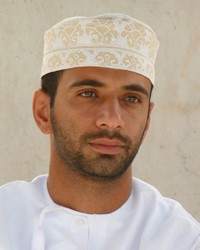Arab, Omani in Yemen

Photo Source:
CharlesFred - Flickr
Creative Commons
|
Send Joshua Project a map of this people group.
|
| People Name: | Arab, Omani |
| Country: | Yemen |
| 10/40 Window: | Yes |
| Population: | 211,000 |
| World Population: | 3,096,000 |
| Primary Language: | Arabic, Omani |
| Primary Religion: | Islam |
| Christian Adherents: | 0.10 % |
| Evangelicals: | 0.08 % |
| Scripture: | Translation Started |
| Ministry Resources: | No |
| Jesus Film: | No |
| Audio Recordings: | Yes |
| People Cluster: | Arab, Arabian |
| Affinity Bloc: | Arab World |
| Progress Level: |
|
Introduction / History
Omani Arabs represent less than one percent of Yemen's total population. They probably immigrated to Yemen from Oman during the 1800s. The Omani are set apart from other peoples by their unique use of the Arabic language which is different than the Yemeni dialects.
Yemen is located in the mountainous southern part of the Arabian Peninsula and Oman is located to their east. Most of its citizens live in the Tihama foothills and central highlands of the north. The Omani Arabs are located in the less populated southern region in Yemen. The entire area is extremely hot with temperatures as high as 129F. Severe sandstorms are common during the winter months. Most of the country averages five inches of rain per year; however, it may not rain in the desert areas for as long as five years.
What Are Their Lives Like?
Most of the Omani either live in rural areas on the outskirts of towns or in small villages located near their farmland. They rely mainly on farming and raising livestock for their livelihood. Coffee, fruits, grains, and vegetables are their principal crops. Those who live in the drier regions raise sheep.
Some of the Omani are craftsmen who make a living by working with leather, iron, textiles, and jewelry. Many of the younger men have left Yemen in search of jobs in Saudi Arabia, Yemen and other countries. Since the 1980s, the Yemeni have worked to turn the desert areas into farmland by means of dams, irrigation, and other developmental projects.
The Omani Arabs live in extended family units. Their society is patriarchal, or male-dominated. The men do not abuse this authority because they believe that their families should obey them out of respect, rather than fear. Also, there are clearly defined roles for both sexes. The men work outside in the fields while women work in the homes. Men and women often eat separately and never pray together. While men worship at mosques, women attend religious services at home. Marriages are generally pre-arranged, and children are considered a family's greatest asset.
What Are Their Beliefs?
Omanis were among the first to embrace Islam. They are overwhelmingly Ibadi Muslims, a branch that is similar to Sunni Islam. The Ibadis favor the selection of their imams through consensus not heritage. In that way they differ from the dominant Sunni sector of Islam. Some would describe the Ibadi sector of Islam as moderately conservative. As far as we know there are almost no followers of Christ among the Omani Arabs and no fellowships of believers.
What Are Their Needs?
Omani Arabs need the chance to flourish economically so they don't have to migrate to other countries like Yemen. They also need the chance to hear and respond to the claims of Jesus Christ so they can experience the abundant life He offers those who follow Him.
Prayer Points
Pray for persons of peace among Omani Arabs to open the door to the gospel among their communities and family members.
Pray for Omani Arabs in Yemen to have open hearts to the One who offers life to the full.
Pray for a massive movement to Christ among the Omani Arabs no matter where they live.
Pray for Christ's ambassadors to go to them.